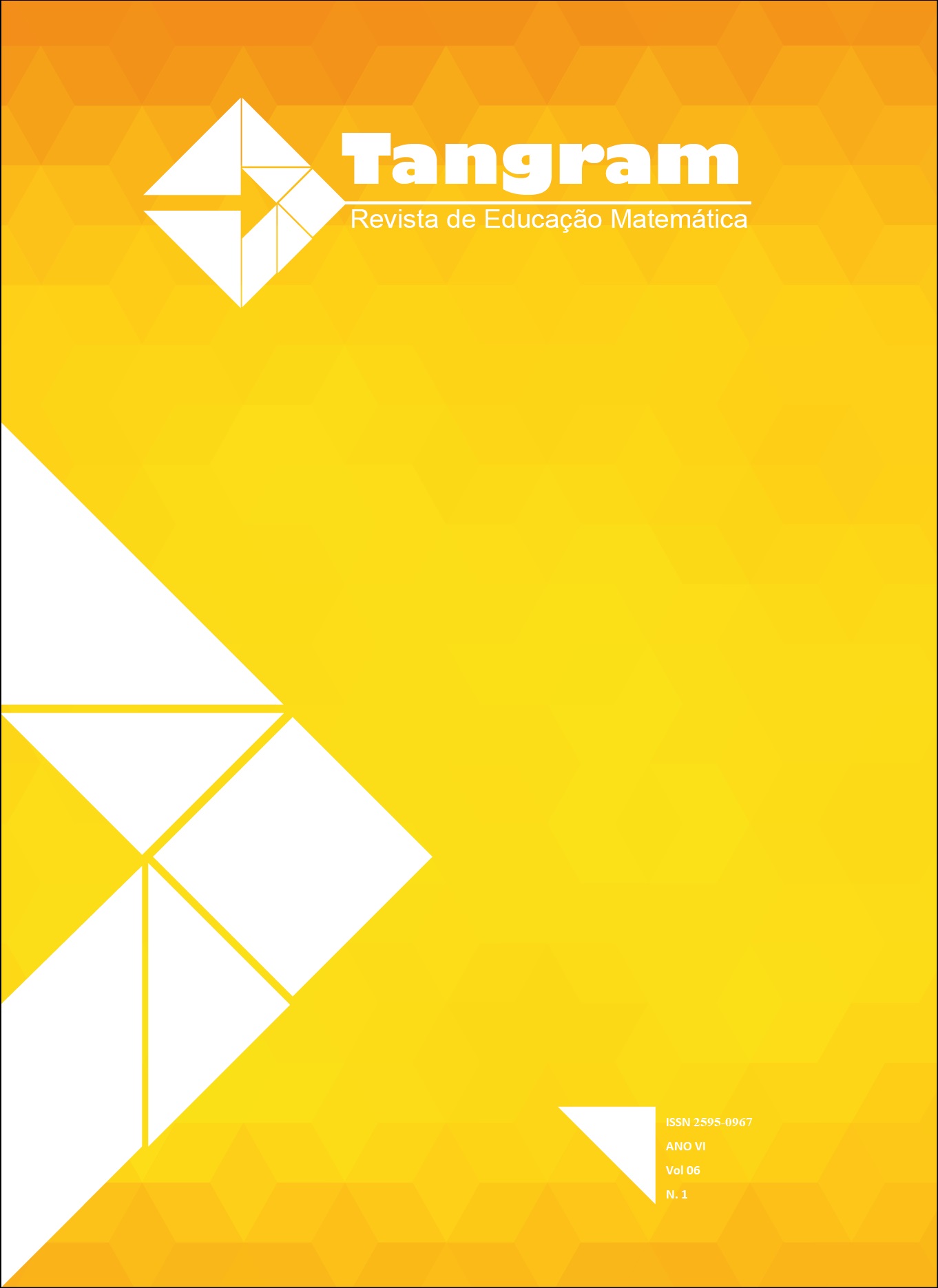The Brazilian Mathematics Educator Ubiratan D’Ambrosio in vídeos
Ethnomathematics and the unveiling of Mathematics
DOI:
https://doi.org/10.30612/tangram.v6i1.16878Keywords:
Mathematics Education, Ethnomathematics, Digital media (YouTube)Abstract
The aim of this article, of a qualitative approach and descriptive-exploratory nature, was to analyze the contribution of audiovisual material made available on the YouTube platform with the participation of Ubiratan D'Ambrosio on Ethnomathematics. The procedure was a survey and selection of audiovisual material on YouTube with a speech by D'Ambrosio that included the subject of Ethnomathematics and with more than 5,000 views. Six videos, which were made available between 2013 and 2020, were selected. They have a duration varying between five minutes and two hours. The audiovisual material available contains conceptualization and discussion of Ethnomathematics, in addition to the possibility of access and comprehension in a distinctive manner utilizing digital media. According to the theorist, and based on the video analysis, Ethnomathematics is a cultural construction carried out by different groups in their daily lives in the search for survival and transcendence. The importance of digital media as a means of access to information and democratization of knowledge is also emphasized.
Downloads
References
Burgess, J., & Green, J. (2009). Youtube e a revolução digital: como o maior fenômeno da cultura participativa transformou a mídia e a sociedade. Trad. Ricardo Giassetti. São Paulo, Brasil: Aleph.
Borges, R. A. S., Silva, A. R. D., & Campos, T. M. M. (2014, december). A formação do Educador Matemático Ubiratan D'Ambrosio: trajetória e memória. Bolema: Boletim de Educação Matemática [online], 28 (50), 1056-1076.
https://doi.org/10.1590/1980-4415v28n50a03
D´Ambrosio, U. (1996). Educação Matemática: da teoria à prática. Campinas, SP, Brasil: Papirus.
D´Ambrosio, U. (2001). Etnomatemática - Elo entre as tradições e a modernidade. Belo Horizonte, MG, Brasil: Autêntica Editora.
D´Ambrosio, U. (2005, january/april). Sociedade, cultura, matemática e seu ensino. Educação e Pesquisa, São Paulo, 31(1), 99-120.
https://doi.org/10.1590/S1517-97022005000100008
D´Ambrosio, U. (2008, january/june). O Programa Etnomatemática: uma síntese. Acta Scientiae, Canoas, Brasil, 10(1), 7-16. Recuperado de http://www.periodicos.ulbra.br/index.php/acta/article/viewFile/74/66
D´Ambrosio, U. (2018, january/june). Etnomatemática, justiça social e sustentabilidade. Estudos Avançados, 32(94), 189-204.
https://doi.org/10.1590/s0103-40142018.3294.0014
D´Ambrosio, U. (2019, june). O Programa Etnomatemática e a Crise da Civilização. Hipátia, 4(1), 16-25. Recuperado de https://ojs.ifsp.edu.br/index.php/hipatia/article/view/1087/803
Fraz, J. N. (2004). Olhares sobre a História de Brasília: uma análise das representações de estudantes sobre a história de Brasília hoje, a partir do documentário Brasília segundo Feldman. [Dissertação de Mestrado em Educação] Universidade de Brasília - PPGE/UnB.
Fraz, J. N., & Moreira, G. E. (2022). A História da Matemática em cenas: um diálogo com o documentário Os Gênios do Oriente e a Educação Matemática. TANGRAM - Revista de Educação Matemática, [S. l.], 5 (1) 37-59.
https://doi.org/10.30612/tangram.v5i1.13434
Moura, E. M. B., Fraz, J. N., Santos, K. V. G., & Moreira, G. E. (2021). Grandezas e Medidas no contexto da inclusão: a Educação Matemática na formação do professor. Educação Matemática Debate, 5(11), 1-25, Montes Claros, MG, Brasil.
https://doi.org/10.46551/emd.e202113
Oliveira, J. N. (2017, september). YouTube como fonte de conhecimento: Análise sobre como o YouTube auxilia na construção da vida profissional e na desintermediação das práticas em grupos de camada popular. Intercom – Sociedade Brasileira de Estudos Interdisciplinares da Comunicação. 40º Congresso Brasileiro de Ciências da Comunicação. Anais [...], Curitiba, PR, Brasil, n/p. Recuperado de https://portalintercom.org.br/anais/nacional2017/resumos/R12-0723-1.pdf
Silva, C. S., & Nau Literária, C. E. (2013, january/june). Do griô ao vovô: o contador de histórias tradicional africano e suas representações na literatura infantil. Nau Literária: crítica e teoria de literaturas, 9(2), Dossiê Voz e Interculturalidade.
https://doi.org/10.22456/1981-4526.43352
Sorj, B. (2003). brasil@povo.com: a luta contra a desigualdade na Sociedade da Informação. Rio de Janeiro: Jorge Zahar Ed. Brasília, DF, Brasil: Unesco.
Urton, G. (1997). The Social Life of Numbers. A Quechua Ontology of Numbers and Philosophy of Arithmetic, University of Texas Press, Austin.
Vieira, L. B., & Moreira, G. E. (2020). Sociedade Contemporânea e o Ensino de Matemática: conexões com a Educação em Direitos Humanos. Brazilian Applied Science Review, Curitiba, Brasil, 4(2), 478-490.
Downloads
Published
How to Cite
Issue
Section
License

This work is licensed under a Creative Commons Attribution-NonCommercial-ShareAlike 3.0 Unported License.
Authors must accept the publication rules when submitting the journal, as well as agree to the following terms:
(a) The Editorial Board reserves the right to make changes to the Portuguese language in the originals to maintain the cultured standard of the language, while respecting the style of the authors.
(b) Authors retain the copyright and grant the journal the right to first publication, with the work simultaneously licensed under the Attribution-NonCommercial-ShareAlike 3.0 Brazil (CC BY-NC-SA 3.0 BR) that allows: Share - copy and redistribute the material in any medium or format and Adapt - remix, transform, and create from the material. CC BY-NC-SA 3.0 BR considers the following terms:
- Attribution - You must give the appropriate credit, provide a link to the license and indicate whether changes have been made. You must do so under any reasonable circumstances, but in no way that would suggest that the licensor supports you or your use.
- NonCommercial - You may not use the material for commercial purposes.
- Sharing - If you remix, transform, or create from material, you must distribute your contributions under the same license as the original.
- No additional restrictions - You may not apply legal terms or technological measures that legally restrict others from doing anything that the license permits.
(c) After publication, authors are allowed and encouraged to publish and distribute their work online - in institutional repositories, personal page, social network or other scientific dissemination sites, as long as the publication is not for commercial purposes.






